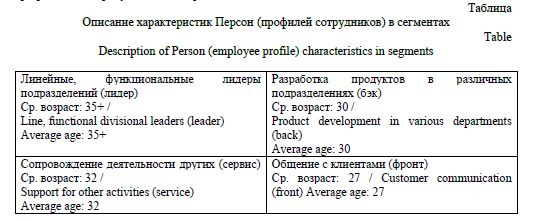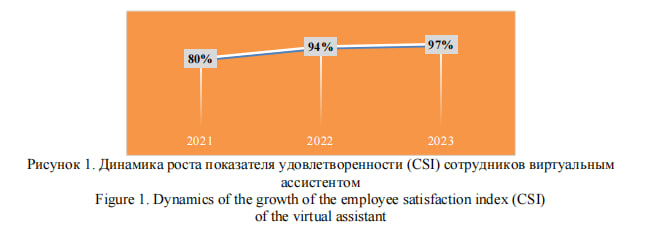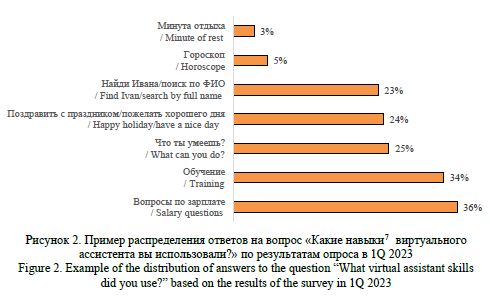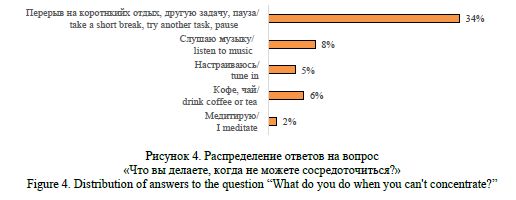Innovative potential and risks of human-centered interaction between young employees and AI Assistants
This article explores the possibilities and prospects of applying artificial intelligence in professional activities through the paradigm of human-centeredness. AI assistants, built on the principles of human-centricity and efficiency, can serve as an innovative potential for young employees in the context of digital transformation. The research problem lies in the fact that the “Human-AI Assistant” interaction exhibits the following issues: insufficient emotional engagement of users, risks of digital dependency among young employees, and distrust in algorithmic AI solutions. All this creates the need to adapt to new forms of interaction between young employees and AI assistants based on collaboration and collegial relationships. The purpose of the article is to examine the innovative potential and risks of young employees' interaction with AI assistants, grounded in human-centered values. The study's findings indicate that modern AI assistants demonstrate a relatively high alignment with human-centered criteria (personalization, security, interface usability, etc.). However, limitations were identified in the development of emotional intelligence, as well as risks of professional deformation among young specialists. The authors conclude that successful interaction with AI assistants is possible under the following conditions: enhancing their emotional and communicative capabilities, increasing the transparency of AI algorithms, implementing adaptation programs for young professionals to work with AI, and maintaining a synergistic balance between technology and human-centered values.
Figures





Skorokhod, O. A., Litash-Sorokina, E. A. (2025), “Innovative potential and risks of human-centered interaction between young employees and AI Assistants”, Research Result. Sociology and management, 11 (3), 203-217. DOI: 10.18413/2408-9338-2025-11-3-1-2.


















While nobody left any comments to this publication.
You can be first.
10 glavnykh rossiyskikh HR-trendov-2025 [10 Main Russian HR Trends-2025] (2024), Collection of Information and Analytical Articles, by M. V. Ivanyushchenkova, V. S. Katkalo, Yu. E. Petrova-Verbitskaya, S. R. Filonovich, Yu. V. Fukolova, E. V. Chernozatonskaya; edited by V. S. Katkalo, M. V. Ivanyushchenkova; National Research University Higher School of Economics, Publishing House of the Higher School of Economics, Moscow, Russia. (In Russian)
Vasilenko, L. A., Meshcheryakova, N. N. (2023), “Digital hybridity: innovative reality or utopia?”, Filosofiya nauki i tehniki, 28 (1), 48-65, DOI: 10.21146/2413-9084-2023-28-1-48-65, EDN: USPLIV. (In Russian).
Vaslavskiy, Ya. I. (2023), “Transformation of the state's role: from capital to human-centricity”, Teoriya i praktika obshhestvennogo razvitiya, (4), 73-77, DOI: 10.24158/tipor.2023.4.9, EDN: BHSJBC. (In Russian).
Zotov, V. V. and Vasilenko, L. A. (2023), “Digital transformation of public administration: unity of service-digital and social-network aspects”, Voprosy gosudarstvennogo i munitsipalnogo upravleniya, (3), 26-47, DOI: 10.17323/1999-5431-2023-0-3-26-47, EDN: EFDDTJ. (In Russian).
Litash-Sorokina, E. A. (2023), “Factors determining quality of life in digital era”, Gosudarstvennoe upravlenie i razvitie Rossii: globalnye trendy i natsionalnye perspektivy: Sbornik statey mezhdunarodnoy konferents-sessii [Public Administration and Development of Russia: Global Trends and National Perspectives: Conference Proceedings], Izdatelskiy dom “Nauchnaya biblioteka”, Moscow, Russia, 3, 511-516. (In Russian).
Tikhonov, A. V. (2021), Reformirovanie vlastno-upravlencheskoy vertikali v usloviyah realizatsii natsionalnyh proektov i aktivizatsii protsessov spontannogo gruppoobrazovaniya [Reforming the vertical of power and management in the context of the implementation of national projects and the activation of spontaneous group formation processes], by Tikhonov, A. V., Bogdanov, V. S., Grechanaya, A. A., Guseynova, K. E., Merzlyakov, A. ., Pochestnev, A. A., Prosyanuk, D. V., Savelyev, I. A., Smirnova, A. S., Shcherbina, V. V., ed. By Tikhonov, A. V., Merzlyakov, A. A., Moscow, Russia, 455, EDN: YNARHI. (In Russian).
Sztompka, P. (2012), Doverie – osnova obshchestva [Trust – The Foundation of Society], Logos, Moscow, Russia, 445. (In Russian).
Shtroo, V. A. (2016), “Human-centric approach and HR management practice in Russian organizations, Organizacionnaya psihologiya, (3), 91-104. (In Russian).
Caldarini, G., Yaf, S. and McGarry, K. A. (2022), “A Literature Survey of Recent Advances in Chatbots”, Information, 13 (1), 41, DOI: 10.3390/info13010041.
Orr, G. (2003), Diffusion of innovations, by Everett Rogers, Retrieved Yanuary, 21, 2005.
Rogers C. (1961), On becoming a person, Houghton Mifflin Company, Boston, 420.
Rogers Everett, M. (1971), Diffusion of innovations, Library of Congress Cataloging in Publication Data, Rev, ed. of: Communication of innovation.